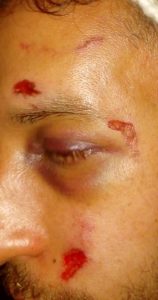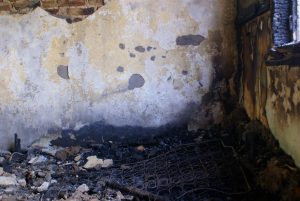This is a translated summary of a press release by the Ministry of Security on the 24th of February.
„Bosnia-Herzegowinas Minister of Security Fahrudin Radončić met on 24th of February with representatives of the Una-Sana Canton and the city of Bihać, to consult with them on a solution for the problems of the migration crisis (sic).
In regards of a new migratory wave (sic) the ministry of security will this year initiate stricter laws as well as providing additional staff for the border police and the service for foreigners.
Radončić announced his intention to close the camps „Bira“ and „Sedra“ in Bihać und Cazin: „For the people of Una-Sana Canton and for me as minister its a legitimate right to set priorities. The first priority is Bosnia-Herzegowina, the second priority is the security and safety and the well-being of Bosnia-Herzegowinas citizens and just on third place there is the security and the concern for the migrants. We must not allow us to bury Bosnia-Herzegowina by transforming it into the biggest parking lot for migrants. For migrants, who do not want to be in this country, but go to other european countries. We have no right to destroy the life and the tourism of this canton, as well as the freedom of movement of our people.“
He encourages the political leaders of the Canton to a more rigid approach towards the refugees who, according to him, committed over 1000 offenses. The politicians are supposed to give information about their acceptance capacity. Radončić pursues a national solution.
The Cantons Premier Mustafa Ružnić showed satisfaction about the outcome of the meeting.“
To contextualise there is a statement by No Name Kitchen about the Situation in Velika Kladuša:
These past two weeks, police pressure has increased against local and foreign volunteers working for organizations providing assistance to people in transit in the border city of Velika Kladusa. This small site located at northeastern Bosnia witnessed the massive deployment of vans and mobile units of special forces, border police and of police from other locations of the Una-Sana Canton. The neighbors noticed the presence of agents in civilian clothes and uniformed in the streets, the main square, cafes and areas such as the bus station and around the Miral refugee camp.
It all began after a protest called by different sectors of migrant people to denounce the violence that they are experiencing by Croatian police when they try to cross to the European Union through the natural borders between both countries. The mobilization, which was to take place on February 15, should have started at the gates of Miral, a refugee camp run by the International Organization for Migration (IOM), and then head to the migration checkpoint in Croatia.
The call for the demonstration triggered the alarm at a regional level and brought back the ghosts of 2018 when a similar demonstration ended with the closure of the border pass and it made clear the differences that some locals had with migrants. There was repression, protesters camped and five days of tension. This time, the arrival of security forces triggered a sort of „curfew“ that left pictures of deserted corners, markets with no customers and stray dogs lying in the middle of the roads. A local shopkeeper in the city center said: „We had never seen so many police at the same time here before, they are everywhere. It’s the first time I’ve seen anything like this“.
Foreigners and locals working in organizations providing assistance to migrants on the ground reported having been followed and interrogated in the streets and in their workspaces. They warned that inspections had been carried out in their homes, they had taken photographs of the people, their documents and belongings, and had even checked their personal computers without prior consent. This pressure on the work teams reduced the pace of their tasks and activities and had a negative impact in the hundreds of men and women who receive food, clothing, medical assistance and different types of care every day. The same police modus operandi took place in the squats, refuges, homes and abandoned buildings where a high percentage of people in transit live. In these cases, the officers insisted on the people that they should not participate in the protest.
On the day of the march, Velika Kladusa woke up deserted. There was no mobilization. A few hundred demonstrators cordoned off by Bosnian police marched inside Miral camp: thousands of refugees from Pakistan, Syria, Morocco, Afganistan, Iraq, and Algeria live there, in a space with capacity for 700 people. Their demands focused on the cessation of the beatings and robberies carried out by the Croatian border police when they are apprehended and pushed back to Bosnia. A young man, who preferred to keep his identity, said „They treat us like animals. They beat us with sticks, they steal our money, they ask for our phones and if they like it or if it is an iPhone, they ask you to unblock it or if not, they destroy it. They burn our clothes, our food, and they force us to come back in socks and t-shirts in winter“.
Despite the call, during the ten days following the march, new cases of violence and push backs from Croatia were reported. Two people were forced to cross the Glina river during their push-back and came back to the city in soaked clothes and with no coats on. Another person arrived to the hospital at the Miral camp with a deep wound in his head. Moreover, groups of nine and six members including Moroccans and Algerians, said they had been chased by green uniformed officials in ski masks, who fired arms. Once they were arrested, they were beaten with batons and forced to give their money and phones. Their rucksacks, jackets, shoes, tents, and food were all burned.
Text and photo by Nel
Noticias desde Velika Kladuša: Las últimas dos semanas aumentó la presión policial contra voluntarios locales y…
Gepostet von No Name Kitchen am Mittwoch, 26. Februar 2020

![[RE:]ports Sarajevo](https://reportssarajevo.blackblogs.org/wp-content/uploads/sites/804/2019/02/cropped-logo_v1-1-Kopie-2.png)
